Sleep is one of the most important yet misunderstood components of human health. While it may appear like a passive condition, sleep is actually a highly dynamic process that supports everything from brain function to immune protection. In recent years, sleep science research has found groundbreaking insights into how and why we sleep – and what happens when we don’t get enough.

The Basics of Sleep Science
Sleep science, often known as somnology, is the study of sleep and its impact on health and behavior. It integrates parts of neuroscience, physiology, psychology, and medicine to explain how sleep impacts every system in the body.
According to statistics, the average adult needs 7 to 9 hours of sleep per night, yet millions fall short. Chronic sleep deprivation is connected to a number of health concerns, including obesity, depression, heart disease, and impaired cognitive performance.
The Stages of Sleep
Sleep is split into two primary categories: Non-REM (Rapid Eye Movement) sleep and REM sleep. These occur in cycles, often repeating every 90 minutes.
1. Non-REM Sleep
This has three stages
- Stage 1 (Light Sleep): A brief transition time when you drift off. Muscle activity slows, and you may have abrupt twitches.
- Stage 2: Heart rate lowers, body temperature drops, and eye movement stops. This stage takes up the majority of your sleep.
- Stage 3 (Deep Sleep): Also known as slow-wave sleep. It’s vital for physical healing, immunological support, and memory consolidation. 2. REM Sleep This period is where most dreaming happens. The brain is very active, simulating wakefulness, yet the body remains unmoving. REM sleep is necessary for emotional processing, learning, and creativity. Interruptions in REM sleep have been related to mood issues, memory impairments, and even decreased problem-solving skills.

The Role of the Circadian Rhythm
The body’s circadian rhythm is a 24-hour internal clock that controls sleep-wake cycles, hormone release, body temperature, and other important activities. It is highly influenced by light and darkness.
Disruption of this pattern, such as through shift work or excessive screen usage at night, can lead to sleep difficulties, metabolic concerns, and mental health challenges. Research suggests that matching daily activities with your natural circadian cycle promotes deeper, more restful sleep.
What Sleep Science Tells Us About Health
1. Sleep and Brain Function
A increasing corpus of studies demonstrates that sleep is crucial for brain plasticity—the brain’s ability to adapt, learn, and develop new memories. During deep sleep, the brain also washes out toxins through a process known as the glymphatic system, which may help guard against neurodegenerative disorders like Alzheimer’s.
2. Sleep and Mental Health
Chronic lack of sleep is intimately related with anxiety, sadness, and emotional instability. Studies show that individuals with insomnia are significantly more likely to develop mental health conditions. Adequate, high-quality sleep, on the other hand, helps regulate emotional reactions and minimize stress.
3. Sleep and Immunity
When you’re sleep-deprived, your body produces less infection-fighting antibodies and cytokines. Research from institutes like the National Institutes of Health reveals that people who sleep well are less likely to get sick and recover faster from illnesses.
4. Sleep and Weight Management
Hormones that govern hunger—ghrelin and leptin—are impacted by sleep. Poor sleep raises ghrelin (which makes you hungry) and decreases leptin (which helps you feel full), leading to increased appetite and weight gain.
Groundbreaking Studies in Sleep Research
- A study published in Science in 2013 revealed that the glymphatic system is more active during sleep, highlighting sleep’s role in brain detoxification. * Research from Harvard Medical School discovered that chronic insomnia raises the chance of getting heart disease, diabetes, and stroke. * A 2020 study from the University of California, Berkeley, showed that a single night of poor sleep can impair emotional regulation, increasing irritability and reducing empathy. These findings underline that sleep is not a luxury – it’s a biological necessity.

Tips to Improve Sleep, Backed by Science
- Maintain a Consistent Sleep Schedule
Going to bed and waking up at the same time each day enhances your circadian rhythm. - Create a Sleep-Friendly Environment
Keep your bedroom cold, quiet, and dark. Consider blackout curtains, white noise machines, or a weighted blanket. - Limit Blue Light Exposure at Night
Blue light from screens interferes with melatonin generation. Turn off electronics at least an hour before bed. - Avoid Stimulants Late in the Day
Caffeine, nicotine, and even vigorous activity close to bedtime can keep you awake longer. - Practice Relaxation Techniques
Deep breathing, meditation, or reading a physical book can help relax the mind and prepare the body for rest.
Conclusion
Sleep is not only about slumber – it’s a powerful, regenerative process that effects every area of our health. The latest sleep science research continues to highlight exactly how vital excellent sleep is for mental clarity, emotional resilience, physical healing, and longevity.
As we better grasp the science of sleep, one thing becomes clear: prioritizing excellent sleep isn’t optional – it’s a cornerstone of a healthy existence.



